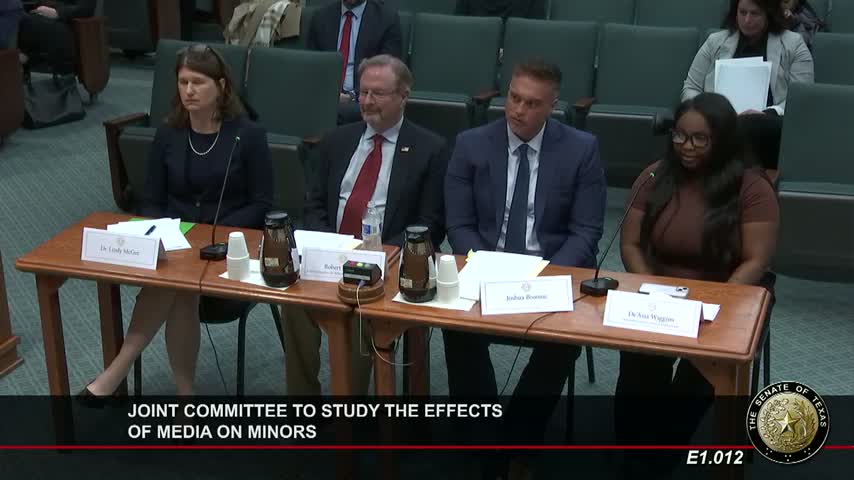Tech expert warns lawmakers about surveillance risks from modern devices during heated hearing
January 07, 2025 | Select, Interim, and Joint Committees, Senate, Legislative, Texas
This article was created by AI summarizing key points discussed. AI makes mistakes, so for full details and context, please refer to the video of the full meeting. Please report any errors so we can fix them. Report an error »

In a recent meeting of the Joint Committee to Study the Effects of Media on Minors in Texas, discussions highlighted the urgent need for regulatory measures in response to the rapid evolution of technology and its implications for privacy and safety. The meeting, held on January 7, 2025, featured a range of perspectives on the intersection of media, technology, and the protection of minors.
A key focus of the discussions was the pervasive nature of surveillance technology embedded in everyday devices, particularly smartphones. One speaker emphasized the alarming reality that many devices continue to track users even when they believe they are turned off. This raises significant concerns about privacy, especially for minors who may be unaware of the extent to which their data is being collected and monitored.
The speaker urged committee members to recognize the speed at which technology evolves, suggesting that regulatory bodies are lagging behind. He pointed out that while technology companies are quick to innovate, the legislative process often fails to keep pace, leaving gaps in protections for vulnerable populations, including children. The urgency of this issue was underscored by the speaker's call for immediate action, stating that monitoring technology must evolve alongside the devices it seeks to regulate.
Additionally, the meeting touched on the importance of proactive measures in data collection and monitoring. The speaker referenced a project, "America's Digital Shield," which aims to gather evidence of potential abuses in digital media. This initiative, which has reportedly cost around $7.5 million, seeks to empower citizens and organizations to combat harmful practices in the digital landscape.
As the committee continues its work, the discussions from this meeting signal a growing recognition of the need for comprehensive strategies to address the challenges posed by modern media and technology. The implications of these conversations extend beyond regulatory frameworks, touching on broader societal concerns about privacy, safety, and the well-being of minors in an increasingly digital world. The committee's next steps will be crucial in determining how effectively Texas can safeguard its youth against the potential harms of media and technology.
A key focus of the discussions was the pervasive nature of surveillance technology embedded in everyday devices, particularly smartphones. One speaker emphasized the alarming reality that many devices continue to track users even when they believe they are turned off. This raises significant concerns about privacy, especially for minors who may be unaware of the extent to which their data is being collected and monitored.
The speaker urged committee members to recognize the speed at which technology evolves, suggesting that regulatory bodies are lagging behind. He pointed out that while technology companies are quick to innovate, the legislative process often fails to keep pace, leaving gaps in protections for vulnerable populations, including children. The urgency of this issue was underscored by the speaker's call for immediate action, stating that monitoring technology must evolve alongside the devices it seeks to regulate.
Additionally, the meeting touched on the importance of proactive measures in data collection and monitoring. The speaker referenced a project, "America's Digital Shield," which aims to gather evidence of potential abuses in digital media. This initiative, which has reportedly cost around $7.5 million, seeks to empower citizens and organizations to combat harmful practices in the digital landscape.
As the committee continues its work, the discussions from this meeting signal a growing recognition of the need for comprehensive strategies to address the challenges posed by modern media and technology. The implications of these conversations extend beyond regulatory frameworks, touching on broader societal concerns about privacy, safety, and the well-being of minors in an increasingly digital world. The committee's next steps will be crucial in determining how effectively Texas can safeguard its youth against the potential harms of media and technology.
View full meeting
This article is based on a recent meeting—watch the full video and explore the complete transcript for deeper insights into the discussion.
View full meeting
